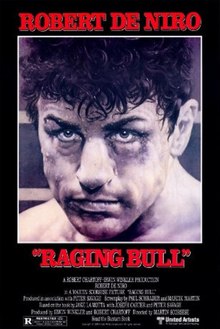
Released: December 19th, 1980
Rated: R
Studio: United Artists
Starring: Robert De Niro, Joe Pesci, Cathy Moriarty
Directed by: Martin Scorsese
Written by: Paul Schrader, Mardik Martin
Personal Bias Alert: likes
boxing movies, finds Scorsese very hit or miss, hates misogyny
3.5 of 10
This
is a film I was bound to dislike. We all
have a few things that we just can’t stand, that make us lean back in our chair,
cross our arms tightly, and do that disgusted scowl. Misogyny is one of mine. Now I’m not claiming that anyone involved in
the making of this film is misogynistic, including its male-centric director
Martin Scorsese. They are simply telling
the story of a man consumed by his own macho ego, who is, yes, misogynistic,
but also temperamental and deeply insecure.
Many excellent films have been made about a flawed character’s descent,
but this is one I simply couldn’t get behind.
Jake
LaMotta (Robert De Niro) is the flawed boxer whose descent is tracked in “Raging
Bull.” His dream is to win the
middleweight title, a goal that’s well within his reach, but his refusal to work
with the mob hampers his chances at a title shot. His
brother, Joey (Joe Pesci), works as his manager. The meat of the film spans Jake’s fifteen
year career, although most of the action takes place outside the ring, with
Jake and Joey navigating their tumultuous relationships with friends, family,
and each other.
The
film is bookended with two scenes of an aging Jake, overweight and puffing on a
cigar, practicing a routine he is about to perform onstage. Much has been made of the impressive weight
gain De Niro underwent to film the later portions of Jake’s life. It helps to see him pant through his lines,
but the performance itself is greater than any physical feat. The brash ego of Jake always shines through,
and De Niro plays the part without any concern for good looks. Pesci works on the same level as De Niro, but
the third wheel in this act, Jake’s wife Vickie played by Cathy Moriarty, is
stiff. I read later that this was her
first acting role, having been recruited for her voice and looks. These things don’t make a performance, and
her inability to bring anything to an otherwise weak character is a big flaw in
the film.
The
cinematography is an often lauded part of the film, and I must agree with the
consensus here. It’s great work; even
the unnecessary black and white shtick that I normally find distractingly
pretentious didn’t bother me here. It
really conveys the feeling of being in a room with these people, of sitting
with their nastiness and madness. The
boxing scenes are visceral, and the repeated shots of water flowing down the
boxer’s bodies was almost hypnotic.
Despite the violence of the fights, we understand the appeal of the
ring. It’s the one place where it’s
acceptable for Jake to be the raging bull that he is.
I
really can’t fault the film from a technical standpoint. It’s very well crafted, but the story just
didn’t work for me. The first scene we
get of Jake as a young man outside the ring is him blowing up at his wife for
cooking a steak too long. It’s a long
verbal and physical explosion that makes Jake’s flaws immediately
apparent. While I hated the misogyny
Jake and Joey show throughout the movie, there was still a chance for this film
to be interesting if it truly showed Jake’s descent. The problem is, Jake doesn’t really change
throughout the film. He’s nasty to
everyone, and the conversations and conflicts he has with the people
surrounding him never change. His first
wife disappears shortly after the aforementioned argument, and Jake quickly
picks up Vickie. Their crumbling
marriage is shown, but the film already gave away how Jake’s marriages end. The other major relationship failure is
between Jake and Joey, but that also plays out as an endless repeat of the same
arguments. The movie finally gets
interesting once Jake retires, but until then I found the film to be an
aggravating slog.
Jake
does show a little self-awareness at the end, settling into a life of
small-time performances that pay the bills.
The film ends with Jake reciting the famous monologue from “On the
Waterfront,” in which Marlon Brando blames his brother for his life’s failures
and laments “I coulda been a contender.”
They’re fitting lines for Jake, serving to reveal how little he’s
actually changed. He’s still insecure
and blaming others for his problems, including the person who probably put up
with the most from him. Before taking
the stage, Jake does some shadowboxing to pump himself up. He’s still fighting, but I was simply
uninterested in the fight.
Other Notes:
Ø This
film is based on the real-life Jake LaMotta’s memoir “Raging Bull: My Story.”
Ø As
much as I liked the cinematography, I really didn’t like the slow-motion shot
of Sugar Ray Robinson about to pummel Jake.
It evoked the same weirdness I feel when I see a picture of someone
mid-swing in baseball or tennis. They
always look laughably ridiculous.
Ø I
feel sheepish giving this film a bad review.
It’s like I’m committing film lover blasphemy.

No comments:
Post a Comment